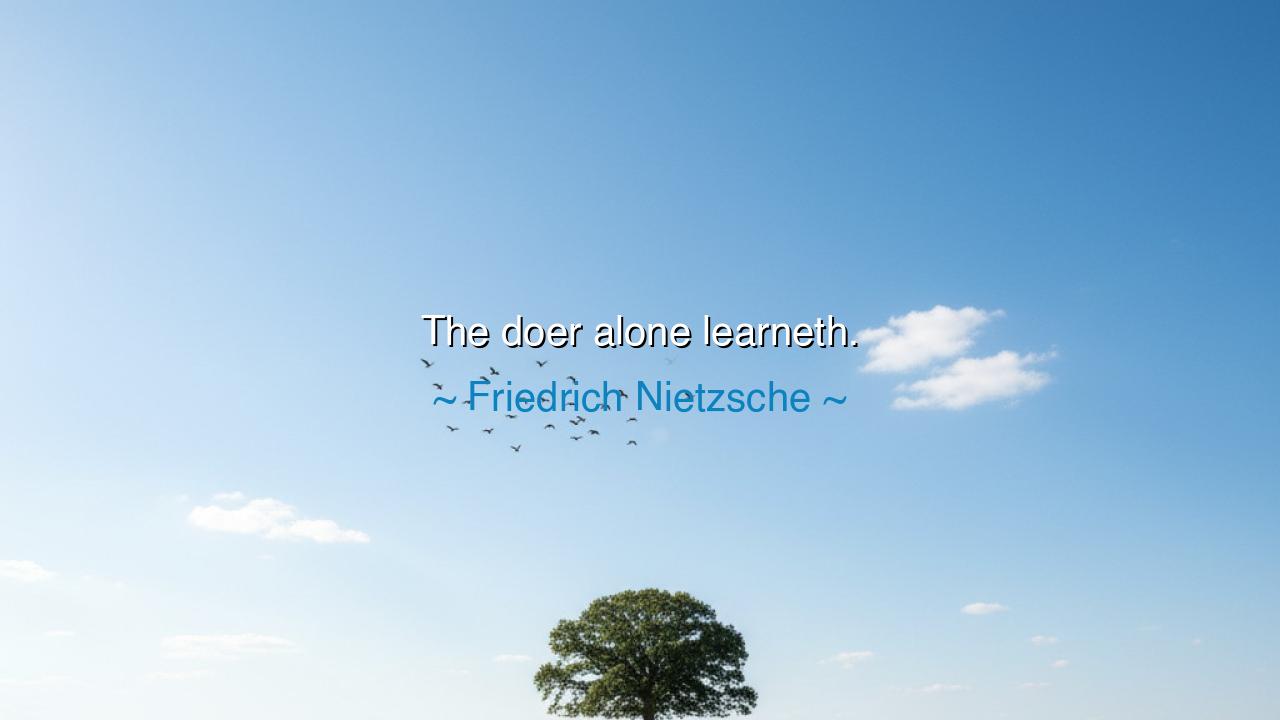
The doer alone learneth.






In the heart of Friedrich Nietzsche's powerful words, “The doer alone learneth,” there lies a profound insight into the essence of action, growth, and knowledge. Nietzsche’s words remind us that learning is not merely the accumulation of facts or the passive receipt of knowledge; it is an active, transformative process that can only be understood through doing. To learn is to engage with the world directly, to experience, to test, and to act. It is only through action that true understanding is forged, for the doer is the one who feels the weight of their choices, learns from the results, and refines their wisdom through experience.
The ancients understood well the power of action in the pursuit of knowledge. In the philosophy of Aristotle, the concept of praxis—or practical knowledge—was central. Aristotle believed that while theory and intellectual reflection were necessary, it was only in action that the philosopher could truly understand and apply the deeper truths of life. Aristotle spoke of the golden mean, where virtue is found not in theoretical contemplation but in the balance between extremes, achieved only through lived experience. The doer, for Aristotle, was the one who moved beyond mere thought to shape their world through action, thus achieving true wisdom.
Similarly, the story of Socrates, the great teacher, offers insight into Nietzsche's idea. Socrates was not merely a man of words and ideas; he was a man of action. He lived his philosophy, engaging with the people of Athens, questioning them, challenging them, and forcing them to reflect on their lives. His method was based on dialogue, yes, but it was a dialogue that led to action—action that compelled the individual to reexamine their beliefs, to test their assumptions, and to grow. For Socrates, learning was never about passive study but about the active engagement with the world and its complexities. As he said, “The unexamined life is not worth living.” The doer, in this sense, is not the one who simply observes life, but the one who steps into it, wrestles with it, and through action discovers what is true.
In more recent history, the life of Mahatma Gandhi provides a powerful example of Nietzsche’s teaching. Gandhi’s path was not one of intellectual theory alone but one of active resistance to injustice. His philosophy of nonviolence was not merely something he talked about; it was a way of life. He practiced his beliefs every day, engaging in civil disobedience, hunger strikes, and peaceful protests. Gandhi’s profound wisdom was not gained through reading alone, but through his actions—his direct engagement with the world and his willingness to put his philosophy to the test in the face of immense personal and political adversity. Through his doing, he learned not only the power of nonviolence but also the capacity of the human spirit to endure and overcome.
Nietzsche’s call, then, is a call to engage deeply with the world, to test our ideas through action, and to embrace the discomfort and growth that comes with doing. The doer is the one who learns, because they alone encounter the world in its raw, unrefined state. They face the challenges and consequences of their actions, and in doing so, they transform themselves. The doer understands that knowledge is not something that can be passively absorbed like water in a vessel, but something that must be earned through struggle, effort, and commitment. It is only through this active engagement that true understanding takes root and flourishes.
The lesson of Nietzsche’s words is clear: knowledge is not the mere collection of facts, but the wisdom that emerges from action. The doer learns because they face the world head-on, testing their ideas and principles, and adapting them in the light of experience. Action is not just a means to an end, but the very process through which we grow and evolve. Reflection alone will never lead to true understanding; it must be accompanied by the courage to step into the world and make our beliefs real.
Let us take action: In our own lives, let us embrace the role of the doer. Let us not wait for perfect conditions or the perfect understanding of the world, but take the first steps toward action. Whether it is in our work, our relationships, or our personal growth, let us test our ideas and beliefs through the experiences we create. Learning comes not from sitting idly by, but from engaging with life’s complexities, from taking risks, from making mistakes, and from learning through experience. Let us not be afraid of failure or setbacks, but embrace them as essential parts of the journey to wisdom. For only in doing do we truly learn.






AAdministratorAdministrator
Welcome, honored guests. Please leave a comment, we will respond soon